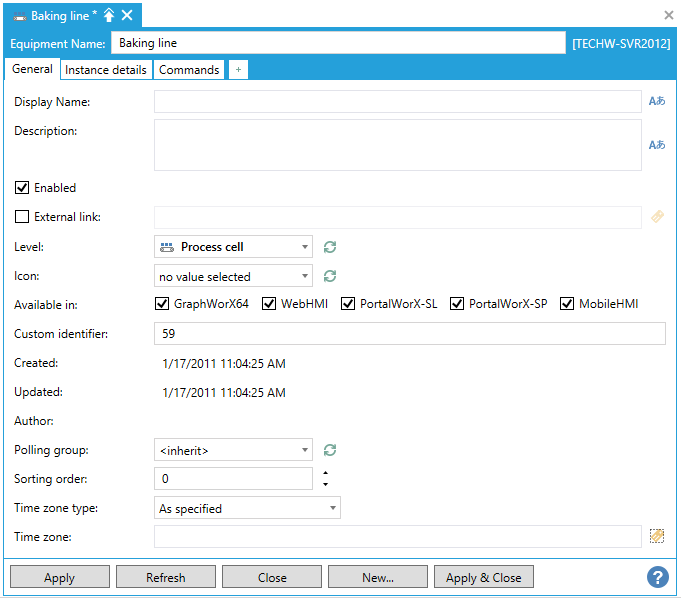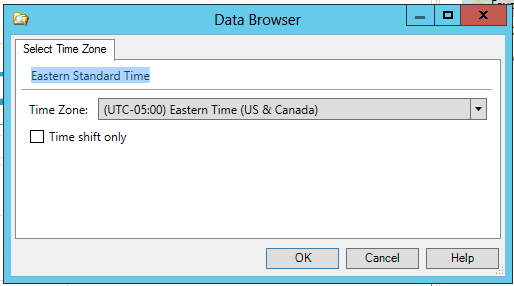Properties Tab for Equipment
On the Properties tab for equipment (shown below), you can configure basic identifying information about an equipment node.
|
|
Tip: An equipment node's information may be preconfigured if it was created using an equipment class. Equipment classes can contain template information, including aliases that are identified as being surrounded by /? and ?/. For more information about equipment classes, refer to the Creating Equipment Classes for Use as Templates topic. |
Equipment Form - Showing the Properties Tab

In the Workbench, expand your project, then the AssetWorX provider node. Expand the asset tree and click on the equipment you are entering properties for. The above image displays Equipment properties, with the Properties tab selected. Use this tab to change the equipment icon, enable or activate the equipment, enter a custom identifier, specify an equipment class, or adjust its level in the asset tree. Each prompt on this sub-tab is described below.
Options on the Properties sub-tab are described below:
-
Display Name - Enter a name for how the equipment will appear in the asset navigator. Click on the
 button
to open the Data Browser, where you can within existing Language Aliases.
button
to open the Data Browser, where you can within existing Language Aliases. -
Description*: A description of the equipment node. This description is used as a tool tip when the cursor is held over the node.
-
Enabled - A check mark indicates that the equipment is active, and data is being collected for it. If the equipment is not active, or if you do not want its data collected at this time, leave the box unchecked. For more information, refer to the Activating Equipment topic.
-
External link type - Use the pulldown menu to select from Off, AssetWorX, or Tunnel (limited). The selection will change some defaults within the remaining equipment properties.
-
External link - Clicking this checkbox allows you to create an external link to an asset on another computer. The link must be an asset on another computer that is connected via your FrameWorX Network. Clicking the ellipsis button to the right of the text entry field opens the Data Browser, which allows you to navigate to your selected icon. Once you have selected your desired asset, it will appear in the text entry field, as shown below. For more information, see Distributed Asset Catalog Runtime.
-
Level - The equipment node's level in the asset tree. For most equipment, you cannot change the level by using this field; it is determined by the level of the parent equipment. However, if the level of the parent equipment can be nested, you must choose which level the equipment belongs to: the level of the parent or the next level down. For more about levels, refer to the Why an Equipment Hierarchy with Tiers? topic.
-
Icon - The icon to display for the equipment's node in the asset tree. For more about these icons, refer to the Configuring icons for the asset tree topic. <default> means that the icon that is defined for the tier in the hierarchy is used for the equipment node in the asset tree; however, if the equipment node was created using an equipment class, <default> means that the icon defined for the equipment class is used in the asset tree. You can select a different icon from the drop-down list.
-
Available in - These checkboxes give you the ability to decide in which ICONICS products the selected item (in which you are presently setting Properties) will appear. These currently include GraphWorX64, WebHMI, and MobileHMI.
-
Custom identifier* - The code or ID used for the equipment in the external system from which you collect data about the equipment. This field is required if you are using equipment data from an external or legacy system. You can use alphanumeric characters of any type, including special characters. The identifier is case sensitive; enter it exactly as it is defined for the equipment in the external or legacy system. If you are using an external or legacy system, and you don't enter the equipment's identifying code or ID from that system, no information will be available for the equipment.
-
Created - The date and time the equipment node was created.
-
Updated - The date and time the equipment node was updated last.
-
Author* - The name or other appropriate information identifying the person or department responsible for maintaining the equipment node in AssetWorX.
-
Polling group - Use the pulldown menu to select which Polling Group will include the presently selected asset.
-
Sorting order - This navigator can sort assets using this parameter.
-
Time zone type - Use the pulldown menu to select either Inherit (which will cause the selected asset to inherit the time zone for any parent-level asset or pre-set time zone) or As specified (which will allow you to set your preferred time zone in the Time Zone settings).
-
Time zone - If you selected "As specified" in the Time zone type settings, you can enter a time zone in the text entry field or click on the
 button to open the Data Browser and .
button to open the Data Browser and .
* If the equipment node was created using an equipment class, and this or other fields contain aliases (that is, variables that are surrounded by /? and ?/), you can replace the aliases with values that are appropriate for this equipment node by instantiating the aliases. For more information, refer to the Instantiating an Equipment Node's Aliases topic.
See also:
